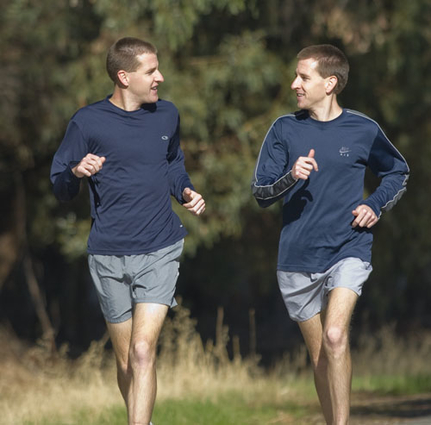Running unites brothers in race of their lives
 (Download Image)
Photo by Jacqueline McBride/NEWSLINE Scott, left, and Paul Reisdorf
(Download Image)
Photo by Jacqueline McBride/NEWSLINE Scott, left, and Paul Reisdorf
Scott Reisdorf runs as if his brother’s life depended on it.
And in some respects it may.
Reisdorf, a computer scientist in Information and Communication Services (ICS), completed a marathon in Sacramento two weeks ago Saturday at a brisk 7:06-minute-a-mile pace. But more important to Reisdorf than his impressive 3:06:21 overall time was the $1,500 he raised for the non-profit National Brain Tumor Foundation, which funds research to find a cure for brain cancer.
Scott’s twin brother and running partner Paul, also a computer scientist in ICS, was diagnosed with brain cancer July 5. Paul underwent surgery July 6 and surgeons succeeded in removing 75 percent of the eight-centimeter malignant tumor — a grade 2 oligodendro giloma tumor.
Since then he has had five-day monthly chemotherapy treatments — Temodar, an oral treatment. He was to begin his latest chemotherapy cycle this week.
"This has been a life-changing experience. It really makes you think about your priorities. Work now stays at work," Paul said, adding he’s making the most of his time with wife Marlys and 7-month-old daughter Heidi in their Tracy home. "I’ve really reduced my stress level a lot."
Though always health conscious, Paul has adjusted his lifestyle and diet. For example, he has reduced red meat consumption and seeks to eat organic as much as possible. He continues to run during his lunch hour with Scott occasionally when he’s not too tired.
Running has been a constant in their lives and Paul takes comfort in being able to get out and run. "I love to run. Ever since high school it has been one of my most enjoyable routines," he said. "I enjoy being outdoors and not letting my mind think of anything else."
Remarkably, Paul bounced back quickly from surgery and has worked through his six cycles of chemotherapy. Though he tires easily, "there’ve been few side effects for me."
The life changes Paul has made have further galvanized his already tight-knit family. "Even my dad’s life has changed and he’s a workaholic. He’s more relaxed about his work and says there’s more to life than work."
The diagnosis was especially devastating for Scott. "I was very shocked. It has totally changed my life. It’s one of those things you think will never affect you," he said. "I can’t imagine what my life would be like without Paul. We do almost everything together. We’re super close."
Scott and Paul, now 28, attended high school in Mission Viejo, where they ran cross country and track together. After graduating, they attended Cal Poly San Luis Obispo, earning degrees in computer science. They went their separate ways briefly after graduating. Paul worked for the U.S. Navy in San Diego and Scott came to LLNL in Plant Engineering. When a position opened in ICS in April 2007, Paul applied and the brothers were reunited at the Lab.
They have been deeply touched by the outpouring of support from colleagues, friends as well as family. "The support has been great and allowed me to keep working," Paul said.
The brothers are currently working on the VISION project in the Security Organization to replace the current badge and access system at the Laboratory. "Paul and Scott are very talented technically," said Tina Huston, group leader for the Security Organization’s IT Group. "They work very well together. From a productivity standpoint, when the two of them work together, it’s like having two and a half people on the job."
Huston says they bring a lot to the job and the group both professionally and personally. "Despite the challenges with Paul’s health and the impact on their family, they never complain. Paul’s illness has really brought home the importance of good health, close friends and family."
Paul says that the treatment strategy is to slow the growth of the tumor as much as possible with chemotherapy. "I refused radiation treatment because of the more severe side effects. I want to be able to enjoy my family and my life as much as possible."
Paul’s oncologist has told him that in cases such as his, current treatments can limit tumor growth for 10-15 years "but eventually it will come back."
Scott said this is time he will use to continue raising funds by running and otherwise drawing attention to brain cancer research. Though the Sacramento marathon is over, the race against time remains as urgent as ever, according to Scott. "In science a lot can happen in 10 years."
Information about the National Brain Tumor Foundation and ways people can contribute is available on Scott’s First Giving Website.




